|
Most of my life I have lived in rural Appalachia. For me, that means walking a far distance to catch the school bus, and then riding it over one hour each way. It means grocery shopping only a few times per month and never letting your vehicle get below a quarter tank of gas. I have no idea what it is like to have fresh and clean water readily available. This has been an issue for my community for ages, but the covid-19 pandemic has brought the lack of access to light in new ways. Since the age of six my family has not had enough water and the small supply has been riddled with iron that turned my blonde hair orange. When I was teenager, I became very ill from contaminated well water and required extensive antibiotics to rid my body of the bacteria. I live in a small unincorporated area located in Clay/Braxton/Nicholas County, West Virginia that is called Wilson Ridge. My neighborhood has thirty homes, a church, a foster home, local farms, and a fruit and vegetable nursery. None of them have permanent access to water, and as I learned through phone interviews as part of a community organizing project for my Master’s degree in Social Work, most of them do not have clean water. Many rely on wells that do not produce enough water to sustain them all year long. Most of the residents live in poverty, and most of the families are aged sixty or older and are increasingly living in poor health. Some of the elderly require clean and sterilized water for feeding tubes and other health conditions. For the past 10 years the community has been told that city water is coming to our neighborhood-yet the promise has not been fulfilled. Until my community organizing class at Concord University, and creating a relationship with Creation Justice Ministries, I perceived my lack of access to water as normal, and the price to pay for living in a rural area. I have always felt helpless to any other outcome. Not having access is how I have always lived. My family’s current water situation consists of letting rain water come off our home gutters into a cistern that is located in the ground under my home. Our well produces very little. We preserve every bit of well water that we can. During dry times, my husband has to haul city water in the back of a pickup truck from a fire hydrant two miles away from our home. The only tank we can afford is a 250-gallon tank and the average person uses at least 80 gallons per day. Our home houses five people, so it is easy to see how frugal we are with our water. Showers have to be five minutes or less with a shower head that limits the amount of water coming out for preservation. My oldest son has what I have determined as a long-term trauma from having to take very quick showers all of his life. This is evidenced by his behavior in taking one hour showers (or longer if permitted) when he stays somewhere that has permanent access. Access to clean, drinkable water is a human right that my community is being denied. Most are living in poverty and do not have higher education. We are being denied this right due to our silence and lack of power. Whether 500 or 30 people are served, access to water is still a right that we should not be denied. Money or lack thereof is the driving factor for not gaining access. Covid-19 has been a scary time for everyone, but for those of us without water access the risks skyrocket. We rely on bottled water for drinking as the water in our cistern is not suitable for drinking due to bacteria presence. During the hoarding phase of the pandemic- there was not always water available to those who most needed it. Further, clean water is needed for hand-washing and sanitation, which we must now do an extraordinary amount of during this pandemic. God has also continued to provide the rain, and we have not gone without water for laundry and showers during this trying time. Due to social distancing, I have been taking a few gallon jugs of water per week to my place of employment and filling them up for cooking purposes. It is embarrassing to explain to people that I need clean water for cooking. While the lack of clean water has been problematic for years- the covid-19 pandemic has heightened the need for readily available clean water and spotlighted the needs of these communities. Water is a human right and a gift from God. All people should have access to clean drinkable water. It is past time my community and others without clean water in West Virginia, gain access. Bryanna Baker-Meckley is a resident of Duck, West Virginia. Baker-Meckley is a Mental Health Therapist with a focus on Substance Use Disorder. She is passionate about water issues after being introduced to the notion that her community should not have to live without access to water. Concord University and Creation Justice Ministries helped Baker-Meckley to understand that having access to water is a human right. Bryanna Baker-Meckly (left) at the West Virginia Water Retreat in October '19
37 Comments
On December 13, white supremacist groups destroyed the "Black Lives Matter" banners of three congregations in Washington, DC: Asbury United Methodist Church, Metropolitan African Methodist Episcopal Church, and Luther Place. Creation Justice Ministries is a membership organization co-founded by the denominations these congregations affiliate with: the United Methodist Church, the African Methodist Episcopal Church, and the Evangelical Lutheran Church in America. Creation Justice Ministries Executive Director Shantha Ready Alonso said of the incidents, "As a Creation Justice community, we know the power of places and symbols that shape our collective memory. White supremacists' December 13th desecration of the three churches' signs is an act of violence that goes far beyond the destruction of property. These churches are sacred places that are integral to the Black history narrative of our country, and that continue to proclaim the precious value of Black lives in the eyes of God, and our community." All three churches are part of the National Park Service's national register of historic places, and share their rich history with visitors. See: Asbury United Methodist Church (NPS, DC), Metropolitan African Methodist Episcopal (NPS, DC), and Luther Place (NPS, DC). Asbury United Methodist Church as well as Metropolitan African Methodist Episcopal Church are both historically Black churches with vibrant, active ministries. They have nourished the souls of great African American leaders such as Mary Church Terrell, Mary McLeod Bethune, Frederick Douglass, and Rosa Parks. Luther Place Memorial Church, and its affiliated N Street Village and Steinbruck Center, play instrumental roles in counteracting homelessness and gentrification in the DC community. Creation Justice Ministries stands with these churches as they speak out against the incidents of December 13th, and our organization affirms that Black Lives Matter. Please read below the churches' responses to the December 13th incidents.
Social Media Commentary tweeted or re-tweeted by Metropolitan African Methodist Episcopal Church: Twitter thread by Luther Place Memorial church: Tweet by neighboring National City Christian Church:
|
About this BlogThis blog shares the activities of Creation Justice Ministries. We educate and equip Christians to protect, restore, and rightly share God's creation. Archives
July 2024
Categories
All
|
Photo from johndillon77
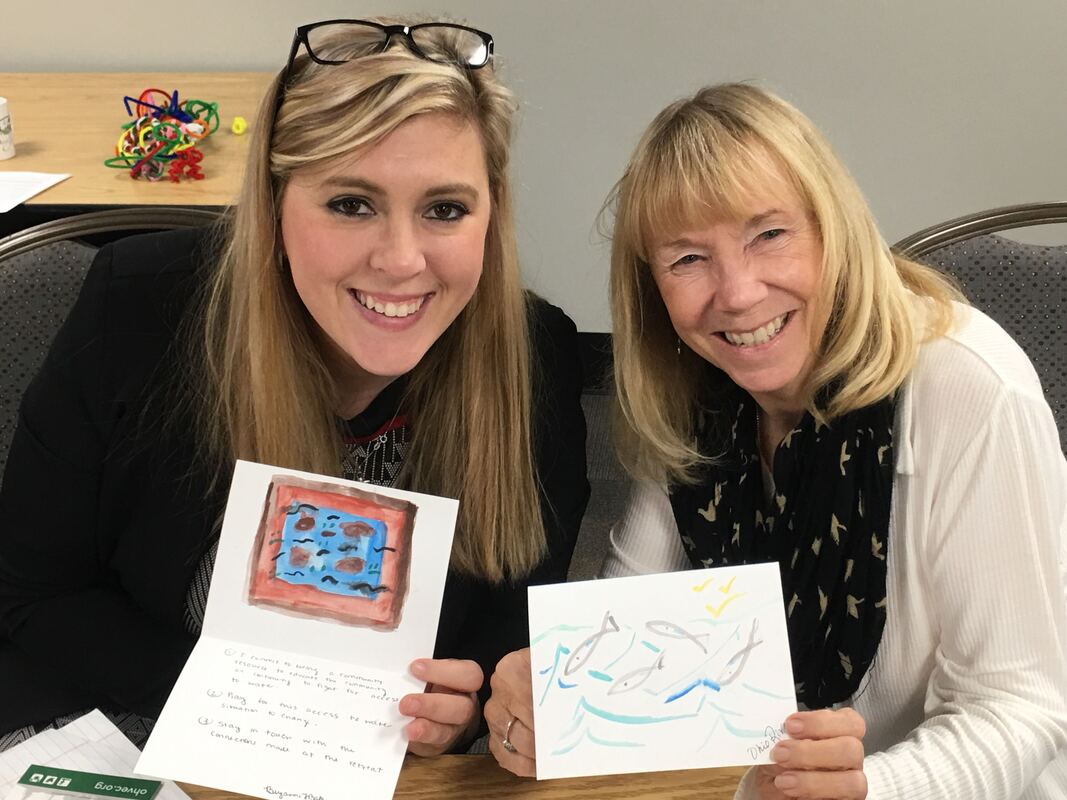
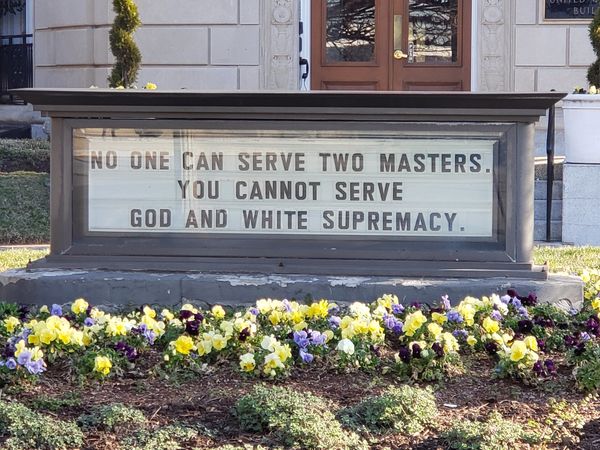
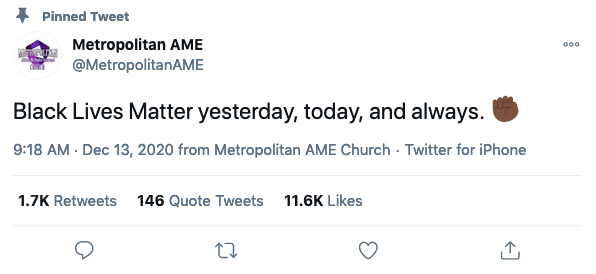
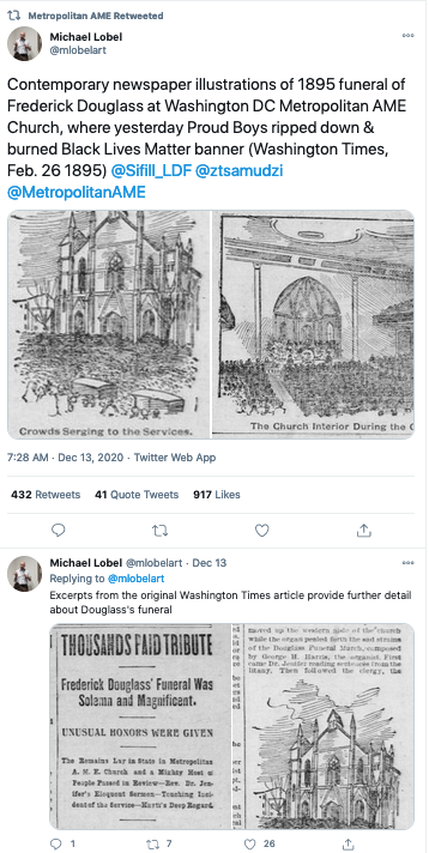
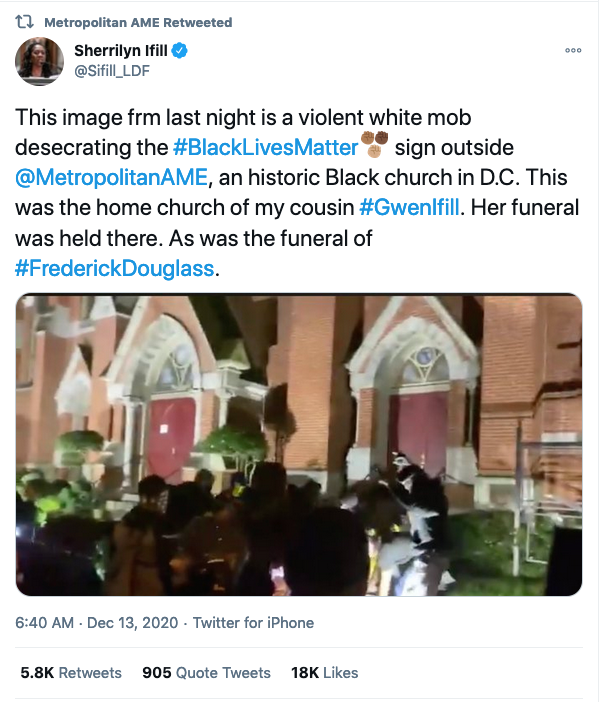
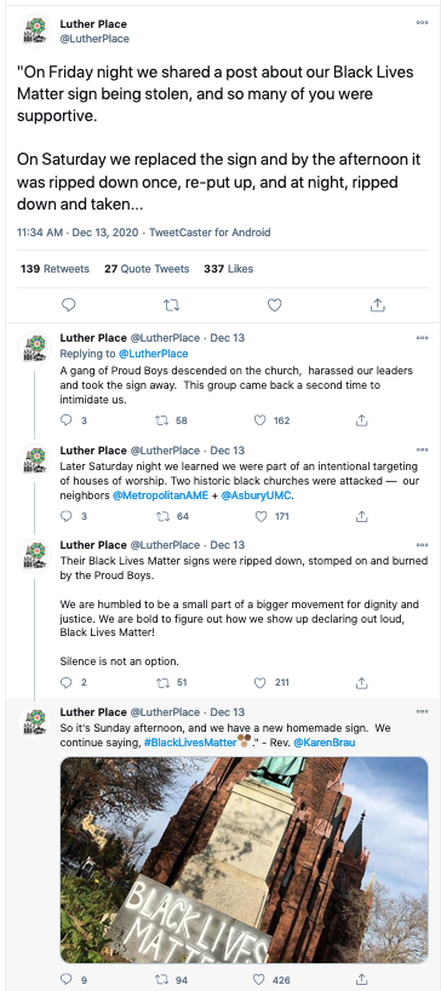
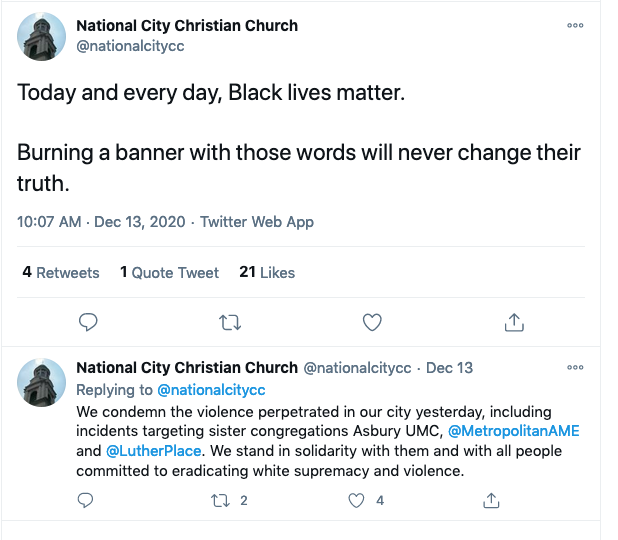
 RSS Feed
RSS Feed